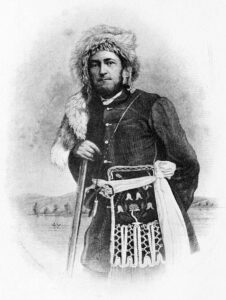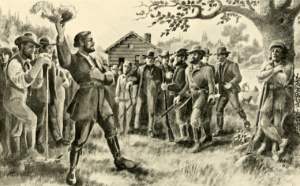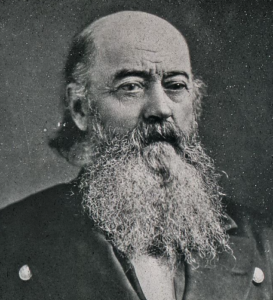 Joe Meek was born in Virginia in 1810. He was a friendly young man, with a great sense of humor, but he had too much rambunctious energy to do well in school. He just couldn’t sit still well enough to focus on his studies. Finally, at 16 years old and illiterate, Meek gave up on school and moved west to join two of his brothers in Missouri. Still, he didn’t give up on all of his learning, just the formal learning. In later years, he taught himself to read and write, but his spelling and grammar remained “highly original” throughout his life.
Joe Meek was born in Virginia in 1810. He was a friendly young man, with a great sense of humor, but he had too much rambunctious energy to do well in school. He just couldn’t sit still well enough to focus on his studies. Finally, at 16 years old and illiterate, Meek gave up on school and moved west to join two of his brothers in Missouri. Still, he didn’t give up on all of his learning, just the formal learning. In later years, he taught himself to read and write, but his spelling and grammar remained “highly original” throughout his life.
Meek seemed to flourish in the West. It appears that he had found his calling, and in early 1829, he joined William Sublette’s ambitious expedition to begin fur trading in the Far West. Meek traveled throughout the West for the next decade. For him there was nothing greater than the adventure and independence of the mountain man life. Meek, the picture of a mountain man, at 6 feet 2 inches tall, and heavily bearded became a favorite character at the annual mountain-men rendezvous. The others loved to listen to his humorous and often exaggerated stories of his wilderness adventures. The truth is, I’m sure many people would have loved to hear about the adventures of the mountain man, especially this one, who was so unique. Like most mountain men, Meek was a renowned grizzly bear hunter. I suppose his stories of his hunting escapades could have been exaggerations, it’s hard to say. Meek claimed he liked to “count coup” on the dangerous animals before killing them, a variation on a Native American practice in which they shamed a live human enemy by tapping them with a long stick. To tap a grizzly bear with a stick, before the attempted kill, took either courage…or stupidity. Meek also claimed that he had wrestled an attacking grizzly with his bare hands before finally sinking a tomahawk into its brain. I suppose that if a grizzly bear attacked you, you would have no choice but to fight for your life, with your bare hands. Having the forethought to go for your tomahawk would be…well, amazing. Most people would try to cover their heads, and hope for the best. Still, that wouldn’t do much good. In a bear attack, you had better fight with everything you have, if you want to live. Maybe  mountain men spent a lot of time considering the possibility of an attack, and practicing in their head exactly how they would handle it.
mountain men spent a lot of time considering the possibility of an attack, and practicing in their head exactly how they would handle it.
Meek soon established good relations with many Native Americans, effectively melding with the Indians. He even married three Native American women, including the daughter of a Nez Perce chief. Now, that didn’t mean that he didn’t fight with the tribes on occasion, or at least the tribes who were hostile to the incursion of the mountain men into their territories. Meek intended to fight for his right to be on the land, the same as the Indians. In the spring of 1837, Meek was nearly killed by a Blackfeet warrior who was taking aim with his bow while Meek tried to reload his Hawken rifle. In the end, the warrior nervously dropped his first arrow while drawing the bow, and Meek had time to reload and shoot. The warrior’s fumble cost him his life, while saving Meek’s life.
After a great run as a mountain man, Meek recognized that the golden era of the free trappers was coming to a close. He began making plans to find another form of income. He joined with another mountain man, and along with his third wife, he guided one of the first wagon trains to cross the Rockies on the Oregon Trail. Once he arrived in Oregon, Meek fell in love with the lush Willamette Valley of western Oregon. He settled down and became a farmer, and actively encouraged other Americans to join him. Of course, more White men on what had been Indian lands, came with safety issued. Meek led a delegation to Washington DC to ask for military protection from Native American attacks and territorial status for Oregon in 1847. Though he arrived “ragged,  dirty, and lousy,” Meek became a bit of a celebrity in the capitol. Not used to the ways of mountain men, the Easterners truly enjoyed the rowdy good humor Meek showed in proclaiming himself the “envoy extraordinary and minister plenipotentiary from the Republic of Oregon to the Court of the United States.” His enthusiasm prompted Congress to making Oregon an official American territory and Meek a US marshal. I wonder if he was shocked by his new role.
dirty, and lousy,” Meek became a bit of a celebrity in the capitol. Not used to the ways of mountain men, the Easterners truly enjoyed the rowdy good humor Meek showed in proclaiming himself the “envoy extraordinary and minister plenipotentiary from the Republic of Oregon to the Court of the United States.” His enthusiasm prompted Congress to making Oregon an official American territory and Meek a US marshal. I wonder if he was shocked by his new role.
He might have been shocked, but Meek embraced his new role. He returned to Oregon and became heavily involved in politics, eventually founded the Oregon Republican Party. After his years of service, he retired to his farm, and on June 20, 1875, at the age of 65, Meek passed away. With his passing the world lost a skilled practitioner of the frontier art of the tall tale. It is said that his life was nearly as adventurous as his stories claimed, but there is no sure line to tell what was real and what was tall tale.


Leave a Reply